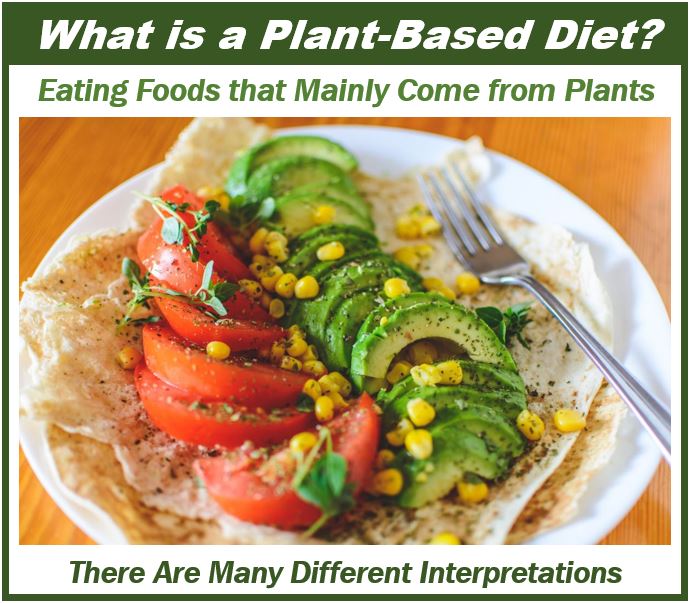Research into following a plant-based diet shows there is a range of positive health benefits. It can help prevent certain diseases such as cardiovascular conditions and diabetes and reduces the risk of some cancers and lowers mortality rates.
While plant-based nutrition is sustainable for all ages and body types, it is important to understand both the pros and cons and that it requires planning, effort, and commitment to reap the benefits.

What is plant-based nutrition?
A plant-based diet focuses on eating foods that mainly come from plants. It includes vegetables, fruit, whole grains, seeds, nuts, beans, legumes, and oils. However, there are varying interpretations of what’s involved with plant-based eating.
Some define it as a vegetarian or vegan diet, while others see it as including more plant-based nutrition and less meat and dairy in their eating plans. Technically, all these definitions are correct.
The central idea of a plant-based diet and nutrition is to place more emphasis on incorporating plant-based foods into your everyday eating plan while reducing or eliminating foods from animals and fish. There is no rule that meat, dairy, or seafood is completely off-limits as long as you’re focused on consuming a bigger variety and number of plant-based foods.
Although refined sugars, some vegetable fats, and white flour can be considered plant-based, these products along with other processed foods, chemicals, preservatives, and artificial additives should be avoided to achieve a healthy, balanced diet.
Why has it become more popular?
There is a growing awareness around the preservation of animals, the environmental impact, disease prevention, and weight management that is fueling the drive to plant-based diets. Overfishing and mass livestock farming is inhumane and negatively impacts the environment and is depleting the oceans of marine life.
The widespread use of chemicals and animal antibiotics increases the risk of disease in humans. Processed meats contain nitrites and nitrates that are carcinogenic, and animal fats contribute to weight-related disorders when consumed in high quantities.
Additionally, the escalating rates of methane released into the atmosphere by livestock also place a heavy footprint on the environment. Another factor is the affordability as organic and free-range meat and dairy products are becoming more expensive.
What does plant-based diet nutrition consist of?
Contrary to popular belief, plant-based nutrition offers sufficient proteins, carbohydrates, minerals, and vitamins when consumed in the correct portions. It is also high in fiber and high in phytonutrients that provide antioxidant and anti-inflammatory benefits.
However, transitioning to a plant-based diet is not all plain sailing. There are pros and cons to be aware of but by implementing the tips offered below, you and your family will be able to get the best nutrition for long-term good health.
Pros
- Reduce the risk of disease associated with processed and red meat. For every 100 grams of meat consumed, the risk of heart and colon disorders and other cancers increases by 14%. This is a great incentive to cut back or eliminate them from your diet.
- Plant-based nutrition is cholesterol-free and low in saturated fats.
- Rich in minerals, vitamins, antioxidants, and fiber and supports your immune system.
- You can grow your own food and decrease household food costs.
- Increase longevity by maintaining a healthy weight and reducing sustained inflammation.
Cons
- It requires a change in attitude towards meat and eating habits. This can be hard for those who have been meat-eaters all their life.
- Preparing menus can initially be a challenge and takes time and effort.
- Good planning is needed to ensure you are getting the right amount of vitamins and minerals otherwise you will need supplements such as vitamin B12 and Omega-3.
Tips to get started
- A good way to start is by including vegetables of different colors in every meal.
- Create meals based on legumes, whole grains, and vegetables.
- Make sure at least two-thirds of your plate comprises vegetables. The remaining third should be a protein like tofu or beans.
- Make meat, dairy, and seafood the smallest portion of your meal.
- If you feel hungry between meals, snack on healthy foods like salsa, hummus, or guacamole.
- Strengthen your diet with vitamins and natural supplements.
- Use good fats from olive oil, nuts, seeds, and avocados.
- Start excluding meat every second day.
- Create meals based on beans, whole grains, and vegetables.
- Include salads with every meal.
- Eat vegetables raw, steam, or grilled.
- Replace sugary foods with fruits.
Who may try plant-based nutrition and why consider trying a plant-based diet?
When planned properly, plant-based nutrition and health are healthy, nutritionally adequate, and suitable for all ages and stages of life. Regardless of your activity levels or health condition, everyone will benefit from focusing on plant-based eating.
Plant-based diets are safe and nutritious for pregnant and lactating women, babies, toddlers, childhood, teenagers, adults, and athletes. Adopting a healthy diet directly affects your emotional and physical well-being and positively impacts your overall health.
There are added benefits for the environment as well. Research shows that plant-based diets help reduce greenhouse-gas emissions, as well as land and water use by decreasing food production. Cutting out meat and dairy decreases a person’s carbon footprint by as much as 73%.
It takes time for awareness to build into action but through education and information, people can start tipping the food system towards accountability and sustainability.
Interesting related article: “What are Food Additives?“

